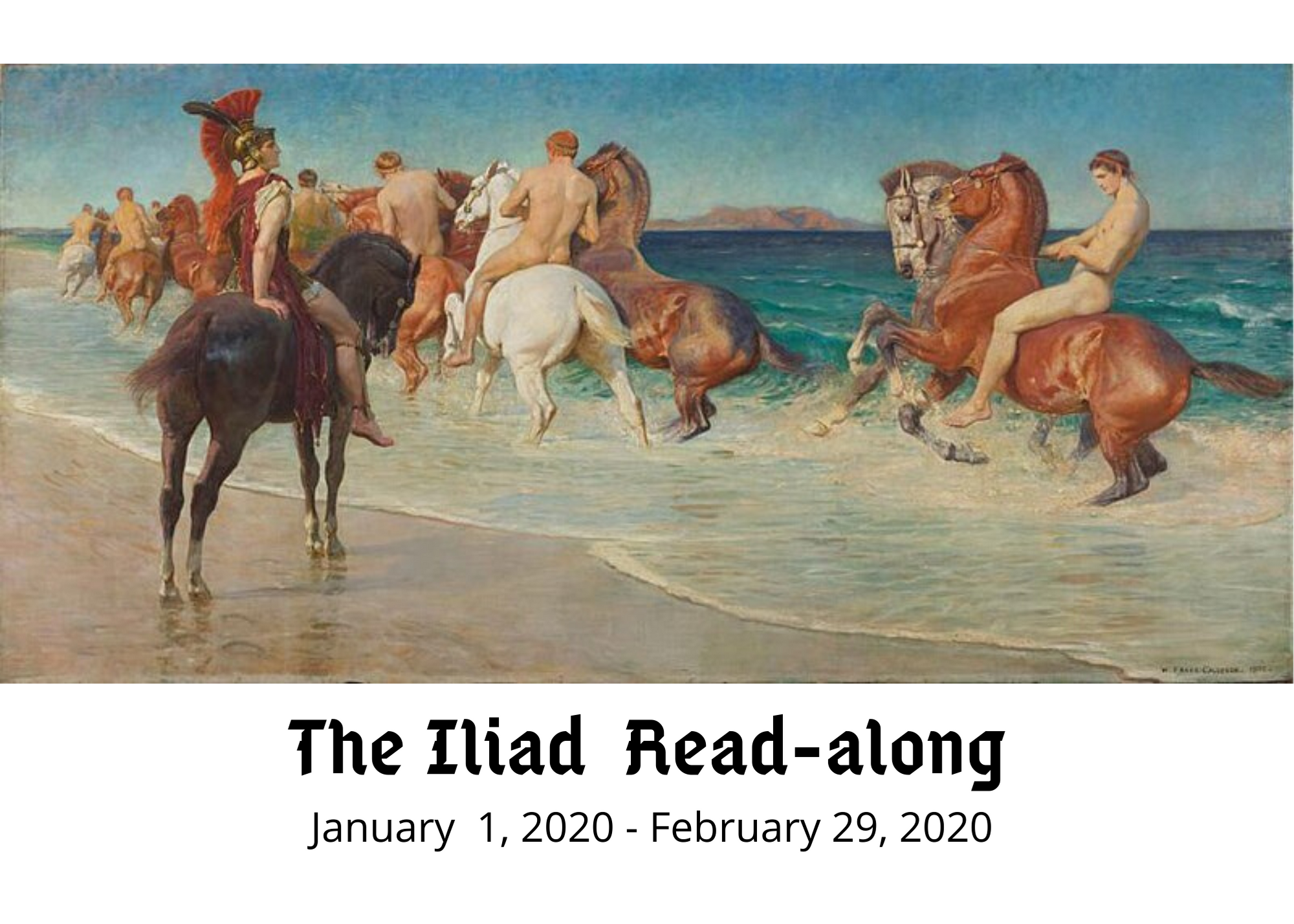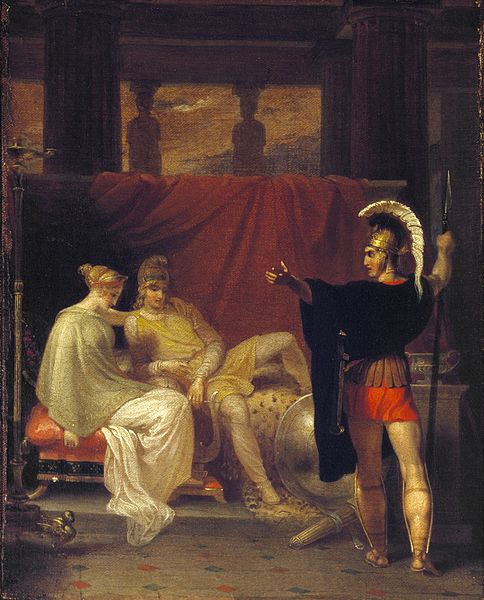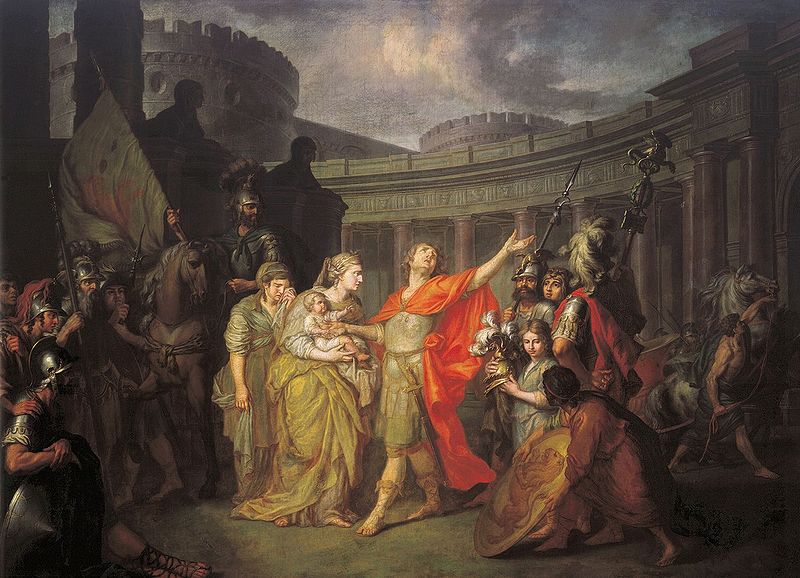
How is everyone doing? Is the going getting easier? Are the characters beginning to stick in your mind? Now we move to more battle scenes with interesting exchanges and the gods are plotting against each other.
Book VII
Hektor and Paris enter the battle with success and seeing that the fighting is going in favour of the Trojans, Athene flies down to meet with Apollo. They both agree to engineer an end to the days fighting by having a Trojan challenge an Achaian in single-combat. Helenos persuades Hektor to fight for the Trojans, and Hektor challenges the Achaians but in fear, they hang back until Menelaus ridicules them as girls for their cowardice and, shamed into action, moves to accept Hektor’s challenge. Agamemnon, however, stays him, saying that even Achilles trembles before this Trojan champion, and Hektor is a better man than Menelaus. Instead, let another fight him. Nestor steps forward and proceeds with a long monologue complete with digressions of his younger feats, and his scolding prompts nine warriors to agree to fight Hektor.
- Agamemon
- Diomedes
- Telamon Aias
- Aias
- Idomeneus
- Meriones
- Eurypylos
- Thoas
- Odysseus
Lots are drawn from the helmet of Agamemnon, and it falls to Telamonian Aias to meet Hektor. After exchanging words of challenge, they go at each other “like lions who live on raw meat,” untl messengers of Zeus, Idaios and Talthybios, bid them hold off fighting until morning, as night approaches. Telamon Aias graciously allows Hektor to decide and Hektor agrees, just as graciously praising Telamon Aias, and as they fought in hate, they now exchange gifts of friendship though on the morn, the gods will decide the victor. While the Achaians sacrifice to Zeus, Nestor urges them to ask for a day to burn their dead and build fortifications; in the citadel of Troy, Antenor presents an option: that Paris return Helen to the Achaians to end the war. Paris adamantly refuses, although he offers to return the spoils he took from Menelaus and add to them. Priam seems to support Paris’ choice, saying (as did Nestor) that they should take a day to bury their dead before a victor in the fighting between Hektor and Telemon Aias is declared. At dawn, Idaios travels to the Achaian ships to deliver Paris’ offer but, lead by Diomedes, the Achaians refuse both the spoils AND Helen because he believes the Trojans are near defeat. Yet they agree to pause to deal with the dead.
Now Poseidon complains to Zeus that the Achaians built their fortifications without proper sacrifice, and Zeus gives leave to destroy the walls. And so the Achaians feast at the end of the day while the gods plot evil against them.
Respect in Battle
In life, whenever we learn information about another person, it allows us to dispel some of our prejudices and there is a connection formed, even if it is a tenuous one. While the listing of the ancestors of many of these warriors in this poem might be tedious, especially to a first time reader. it is important. All the warriors know the background of each other. This fact seems to make the war more than a bloodthirsty, hateful battle. There is often respect shown towards each other that seems to transcend what is practically occurring. We saw the respect between Glaukos and Diomedes as guest-friends and in this book, we have a rather cordial exchange of words and gifts between Hektor and Telemon Aias. I don’t have the sense in this epic of hatred towards the enemy, or at least, a sustained hatred. They often seem more interested in capturing spoils than killing a man (which must link back to kleos and timê – see Introduction). The warriors behave better than the gods in this respect. This war and the mindset behind it seems very different than modern wars. Do you think so as well?
Book VIII
Zeus calls an assembly of the gods and they are all stunned when he announces that he will assist the Trojans and commands that none go against his will. Athene agrees but says they won’t fight but will counsel the Argives / Achaians.
Zeus winds his chariot to Mount Ida to watch the conflict, even sending a thunderbolt over the Achaians, which sent the best of them running for their ships. However, Nestor’s horse is shot with an arrow and the old warrior would have lost his life to Hektor if Diomedes, after futilely called after a fleeing Odysseus, hadn’t taken him up in his chariot. They kill Hector’s charioteer, but Zeus thunders and Diomedes hesitates in indecision whether to pursue Hektor. Hektor rallies his warriors and horses, claiming that if he can capture the shield of Nestor and the corselet of Diomedes, surely the Achaians will depart.
Meanwhile, Hera, piqued by Hektor’s boasting, appeals to Poseidon to go against Zeus’ command yet he balks at her suggestion. Hektor continues his aresteia, yet Hera spurs Agamemnon to rally the Achaians while he pleads to Zeus for their survival. Thus an eagle drops a young fawn on the alter of Zeus and the Achaians recognize the sign of the god; they fight with greater strength of purpose. Telemonian Teukros, the half-brother of Aias, and spurred on by Agmemnon’s fury, attempts to skewer Hektor with an arrow but he misses twice and Hektor’s aim with a crushing boulder finds its mark, smashing him in the chest and rendering his arm useless.
Hektor battles the Achaians back to their ships. The wily Hera now appeals to Athene, and they plot to enter the fray on the side of the Argives, yet Zeus is angered at their machinations and instructs Iris to tell Athene that he will lame her horses and give her lightning wounds from which will take her ten years to recover. However, with Hera he is not so angry as ever he expects her to cross him.
The goddesses stand down, as Hera decrees:
“Alas, daughter of Zeus of the aegis: I can no longer
let us fight in the face of Zeus for the sake of mortals.
Let one of them perish then, let another live, as their fortune
wills; let him, as is his right and as his heart pleases,
work out whatever decrees he will on Danaans and Trojans.”
When Zeus returns to Mount Olympus, Hera and Athene are sulking, and Zeus chastizes them and reveals a foreknowledge of what will occur to bring Achilles back into the battle.
Darkness falls, giving pause to the fighting. Hektor makes a confident speech, and the Trojans make camp by the Achaian ships, burning watch-fires so no Achaian can escape or make mischief.
“So with hearts made high these sat night-long by the outworks
of battle, and ther watchfires blazed numerous about them.
As when in the sky the stars about the moon’s shining
are seen in all their glory, when the air has fallen to stillness,
and all the high places of the hills are clear, and the shoulders out-jutting,
and the deep ravines, as endless bright air spills from the heavens
and all the stars are seen, to make glad the heart of the shepherd;
such in their numbers blazed the watchfires the Trojans were burning
between the waters of Xanthos and the ships, before Ilion.”

Battle at the Ships
The Gods
What do you think the gods stake is in this battle? What do they gain by their interaction with humans? Are the humans simply pawns for their entertainment, or is there some deeper purpose behind their machinations? Does it appear that the humans have respect for the gods or do they simply “use” them in hopes that their favour will get them what they want? (Thanks to Keely for bringing this question to light on her blog!)
⇐ The Iliad – Book V & VI The Iliad – Book IX & X ⇒





I commented at Keely’s post.
They are a mystery to me as well, the gods.
I agree with you, these soldiers have respect for each other. It’s as if they acknowledge that they all are in the same”business”, and the differences between being noble, or coward, etc, happen to both sides.
As for the gods. It’s true that they are upset. Theory. Is it possible that the gods have different roles, and hierarchy, and they are upset when they meddle into each other’s territory? But Zeus rebuked Ares, and he is what we know god of war.
It’s interesting. I will keep seeing their behavior to see.
There’s something I can’t put my finger on, something very different. I truly don’t capture what their relationship with the gods is like. I know they ask for their favor. But before, the first read, it escaped to me how the destruction of Troy is expressed in these first books. And still what you say about the value of seeing how it all unfolds and keeps taking twists and turns, and who among the humans behaves “good” or “bad”, and the gods turbulent exchanges.
You brought up something else that I’ve been mulling over: there are numerous references to warriors hanging back in the fighting yet we also have descriptions of their battle prowess and how they are well-respected and great warriors. So I’m puzzled by the seeming contradiction. Are they hanging back because they really don’t want to fight this war and are only doing it because of oaths? Do they really experience fear at times and hang back? Is this reference emphasizing their humanness and not their cowardice? I wonder ….
As for the gods, they do have different roles and there is a hierarchy but as we see, just because Athene is the goddess of war she doesn’t have full say over battles. Again, they seem to change like the wind and are often at odds with each other. In fact, I can’t remember a time yet when they are in agreement without a command hanging over them.
Oooo, can’t wait for the next chapters. Sulking Achilles finally appears!
Yes. Why oh why don’t they engage in battle in a more prompt manner? And the gods are so random, ha ha ha. I’m also looking forward to sulking Achilles, yes!
It seems to me that the humans have a respect for the gods. Yet sometimes it seems they approach them when they want the gods’ favor. And other times it seems they believe that the gods rule and what the gods decide is what will happen. Basically que sera, sera…what will be, will be.
As to your questions regarding if you think the gods have a stake in the battle or if they gain anything from their interactions with humans…I have no idea at this point. I need to keep an eye out as I read to see if any clues pop up regarding that.
Yes, that’s a good point. Fate is so important in this culture and the gods relate directly to it.
We know that the gods have sides in this war, but I still ask, to what purpose? Perhaps I’m looking too hard for some deeper and meaningful purpose when maybe they view humans like they would toys. It would be useful as I/we read more Greek literature to see how other authors treat the gods.
Hmmm. I’m not sure about the gods treating humans as toys. In a way, yes, but my problem is that they are not in control either. I don’t know. Coming from a christian understanding of deity, it’s hard to see any true deity in the gods. I find them more like super human, and also mirroring humans in a more fantastical way. I find them more like superheros, and like Keely says, it’s the soap opera, the drama, that I find fascinating.
Yes, definitely, I don’t see them as gods in nearly the same way I see God or a deity. They are like squabbling children. I can see why Plato had a definite problem with their portrayal.
After reading This Present Darkness years ago, if the Iliad is a dim reflection of the spiritual wars that take place invisibly around us. I think of Daniel and the angel speaking of battling the King of Persia.
I’m sorry, Sharon, I don’t quite understand. Do you mean the battle between the Achaians and Trojans remind you of spiritual wars, or do you mean the discord between the gods?
Ha, ha, ha! When I saw this in my e mail, all I saw was, “I’m sorry, Sharon….”
Immediately my mind went to the worst. “I’m sorry, Sharon, but your comment is so stupid, I am going to save both of us a lot of embarrassment and not post it.”
I wasn’t clear, though and that is a little stupid of me. Let me try again, because this is something I’ve thought about for a while.
As Christians we know that there is an invisible battle going on all around us. There are two armies. God’s and Satan’s. I firmly believe that these sides are battling over each person on earth and I also believe they are somehow involved in our wars.
The reason I think that is because of what the angel said to Daniel about having to fight the king of Persia (Daniel 10:13).
A side note, Persian legend has it that genii fly through the air and can be transported by missiles. I saw a highly suspenseful and fascinating modern Iranian movie about a genie invading and possessing an apartment building after a missile broke through its roof (during the Iran/Iraq war).
What does that have to The Iliad? In this war, we are aware of not only the human soldiers battling each other, but also the gods taking sides.
My question to myself is, did this belief come from an actual reality that the armies of heaven and Satanic armies are fighting during wars, trying to get specific sides to win?
After all, the Greeks are descended from Noah as well and somewhere they knew the truth of God. Perhaps these sagas are corrupted forms of kernels from actual historical truth about God.
Does that make sense?
Ha, ha! Of course not! I would never say that. But it’s interesting you say this, because I’ve seen university professors turn the simplest comments into a rousing discussion. So every comment is valuable. But in this case, you’re comment was insightful and I wanted to make sure that I fully understood it.
Yes, if I wanted to look at it from my perspective, I could see it this way. But I feel I owe a debt to the author (in this case, the composer) to try to understand it from their perspective or worldview. Because I know my own worldview, I believe I get much more out of the book by trying to understand theirs instead of always confirming mine. And the Greeks wouldn’t have seen it that way. Also, I sometimes wonder if HOW we live our lives is more important than the end of them. AND sometimes, it’s simply poor decisions made by fallen human beings who put someone or something in the place of God. Things never work out well that way. So even though the Greeks won, I don’t believe it made them any happier and, in fact, much tragedy followed.
In any case, thanks for your comment, Sharon! They always make me think! 😀
Hi Cleo, Sorry I still didn’t make myself clear. I don’t think the Greeks were consciously thinking about the actual spiritual war that is going on around us. I was wondering if that was where the got the idea for the gods and goddesses taking sides. That their myths were rooted in an ancient truth, even if they themselves were unaware of the source of their myths.
I did somewhat get that point. Personally, equating the gods and goddesses with spiritual warfare I think is stretching it on the level you mean, however you might get Plato’s nod of approval. 😁 He did NOT like how Homer portrayed the gods and claimed they couldn’t be gods because god/gods can only be good. And I believe Socrates was beginning to believe in only one God, so they were certainly on that track.
Have you ever read A Canticle for Leibowitz? Walter Miller does a fantastic job in showing how truth, over centuries can become/be seen as myth. It’s a great book and I think you’d enjoy it! 🙂
Hi again. I don’t why I am commenting so much on a poem I didn’t even enjoy reading. I’m not trying to have the last word, either. Maybe I’ve got some sort of weird compulsion to make sure I’m being understood (insert eye roll here, if you need to).
I’m not equating the gods/goddess with the heavenly host of God. I am surmising where the origin of the Greek myths might have come from.
I think that I still I have your point, although perhaps I’m not speaking directly to it, but around it. It’s interesting because I was listening to a talk on The Iliad today and they said that it was one case where there was no good vs. evil. This fact is exemplified by Homer’s sympathetic portrayal of the Trojans. They weren’t enemies and, in fact, there is no one truly bad in the Iliad, other than Thersites who is only just annoying. So if spiritual warfare connotes good vs. evil, I’m not sure if it’s portrayed here. They also noted that the gods behave like humans, while the humans are often elevated to gods. Very interesting!
Oh, and thanks for the book suggestion. I’ll look it up.
That sounds like something I’d really enjoy.
You’re welcome!